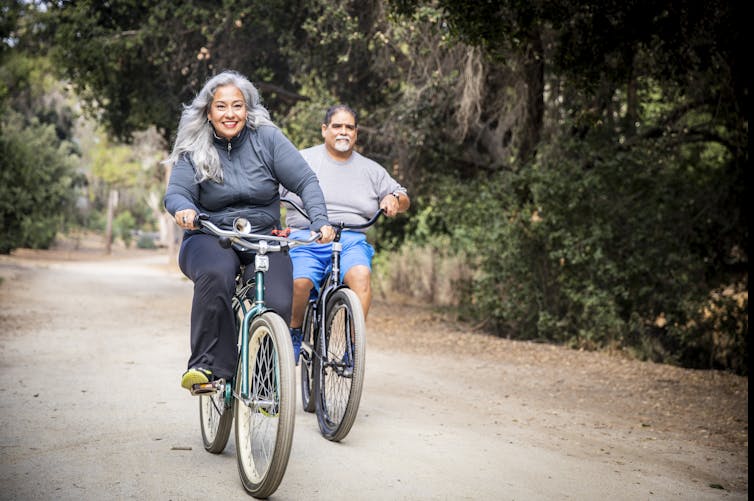The new year is traditionally a time when many people feel a renewed commitment to create healthy habits, such as exercising regularly, drinking more water or eating more healthfully.
It turns out that when it comes to health, married people have an edge, especially married men.
 In relationships, women tend to take the lead in promoting healthy behaviors. Peter Dazeley/The Image Bank via Getty Images
In relationships, women tend to take the lead in promoting healthy behaviors. Peter Dazeley/The Image Bank via Getty Images
People are also reading…
But surely the act of walking down the aisle is not what provides this health advantage.
So what exactly is at play?
As a team, we study how relationships affect health. One of us is a nursing professor who studies how social support influences health behaviors. One is a social health psychologist who explores how stress affects couples’ relationships and health, and one is a social psychologist who researches how relationships influence health behavior changes. Together, we examine how partners influence each other’s health, taking gender into account in this equation.
Health benefits of marriage, for men and women
It’s important to note that most marriage and health studies have been limited to married men and women. But more recent studies are examining these relationships in partners who have the same gender identity, the same biological sex and who are gender diverse.
One theory that seeks to explain the link between marriage and health is the act of self-selection. Simply put, people who are wealthier and healthier than average are more likely not only to get married but also to find a partner who is wealthier and healthier than average. Men and women with poorer health and wealth than average are less likely to marry at all.
While this may be part of the story, marriage also provides partners with a sense of belonging, more opportunities for social engagement and reduced feelings of loneliness. This social integration, or the extent to which people participate in social relationships and activities, can greatly influence health — from reducing the risk of hypertension and heart disease to lowering one’s risk of death or suicide.
 A spouse’s healthy habits, like eating well and exercising, tend to improve a partner’s health too. adamkaz/E+ via Getty Images
A spouse’s healthy habits, like eating well and exercising, tend to improve a partner’s health too. adamkaz/E+ via Getty Images
Another important connection between marriage and health involves the body’s inflammatory process. Research links loneliness and lack of close relationships with inflammation, or the body’s way of reacting to illness, injury or disease. Though inflammation is needed for healing, chronic inflammation is associated with heart disease, arthritis, cancers and autoimmune diseases. While single adults undoubtedly have very meaningful close relationships too, a healthy marriage by nature provides more opportunities for closeness and socialization, supporting the link between marriage and inflammation.
When you dig deeper, gender seems to play a role as well. One study related to marital quality, gender and inflammation found a connection between lower levels of spousal support and higher levels of inflammation for women, but not men. In another study, if couples used negative communication patterns, such as one partner making demands while the other partner withdraws, women but not men experienced heightened inflammation.
Marriage and longevity
Married men and married women live, on average, two years longer than their unmarried counterparts. One reason for this longevity benefit is the influence of marital partners on healthy behaviors. Study after study shows that married people eat better and are less likely to smoke and drink excessively. All of these healthy behaviors help explain why married people tend to live longer. However, men married to women tend to see additional longevity benefits than women married to men, for several possible reasons.
For example, female spouses may be looking out for their male partners, reinforcing healthy behaviors and providing more opportunities for healthy choices. On the flip side, married men are less likely to attempt to influence their wives’ health behaviors.
Women tend to take the lead in promoting healthy behaviors, benefiting their husbands. Data suggests that men and women in same-gender relationships tend to engage in teamwork to mutually promote positive health behaviors. Further, married men and women are more likely to want to change their partners’ health behaviors, such as exercise, especially if the spouses’ habits are worse than their own. These findings suggest that both the person and the partner’s gender matter.
 Data suggests that people in same-gender relationships engage in teamwork when it comes to health. NicolasMcComber/E+ via Getty Images
Data suggests that people in same-gender relationships engage in teamwork when it comes to health. NicolasMcComber/E+ via Getty Images
Relationship quality can also influence health behaviors. For example, in the context of exercise, both men and women who reported higher levels of marital support were more likely to walk for exercise. However, as men aged, the association between marital support and walking became even stronger for them, but the same was not true for married women.
Cultural norms and caregiving
To further understand how men’s health benefits from their wives, consider cultural norms that foster expectations that women will be the primary caretaker in committed relationships.
Middle-aged people, and in particular women, have also been described as the “sandwich generation,” since they are often “sandwiched” between taking care of growing children and aging parents. Caregiving can take a toll on the immune system and one’s overall health. Additionally, invisible labor related to child care and household duties, which often disproportionately fall to women, can leave women with less time for self-care, such as being physically active.
Women also take on more responsibilities in terms of coordinating doctors’ appointments and promoting adherence to medical advice for their husbands than husbands do for their wives. However, men often increase their time spent caregiving when their wives are ill.
Of course, not all marriages are created equal
Relationship quality and relationship conflict also play important roles when it comes to marriage and health. Gendered socialization and power differences often lead to women’s thinking and caring about their relationships more than men, causing women to take primary responsibility for managing relationship issues, while men take on less of the burden.
Research shows that women are also more likely to base their identities on their relationships, and so when they experience marital conflict or other relationship issues, they experience more negative emotional and physical health effects than men. This can include increased risk of metabolic syndrome, inflammation and cardiovascular disease.
Does this mean that all men should get married to protect their health or that unmarried people can’t enjoy the same health benefits as those who have said “I do”?
Not at all. Unmarried people can, of course, enjoy good health and longevity. Creating and maintaining strong social ties and engaging with one’s community go a long way when it comes to health. Further, making the best lifestyle choices available, seeking preventive health care and reducing stress can help everyone live a longer, healthier life.
Libby Richards, associate professor of nursing, Purdue University, has received funding from the National Institutes of Health, The American Nurses Foundation, and is currently funded through the Indiana Clinical and Translational Sciences Institute. She is affiliated with the American Public Health Association and the International Society of Behavioral Nutrition and Physical Activity.
Melissa Franks, associate professor of human development and family studies, Purdue University, receives funding from the Indiana Clinical and Translational Sciences Institute.
Rosie Shrout, assistant professor of human development and family studies, Purdue University, receives funding from the Indiana Clinical and Translational Sciences Institute. She is affiliated with several organizations, including the International Association for Relationships Research, National Council on Family Relations, American Psychosomatic Society, Gerontological Society of America, and Society for Personality and Social Psychology.
This article is republished from The Conversation under a Creative Commons license.
It is common for people to feel tired and groggy in the afternoon, especially after a heavy lunch. Here are four ways to boost your energy lev…
There are apps for everything nowadays, including to help manage mental health. Here are the best ones on the market.
Debt is often labeled either good or bad. Good debt helps you move forward in your financial career, while bad debt holds you back. PennyGem’s…
Consuming too much sugar can cause inflammation and fatigue and increase your risk of heart disease and type 2 diabetes.
Drinking alcohol with some medicines means that the medicine may not work as effectively. But you also run the risk of a potentially fatal overdose.
Eating a balanced diet that is rich in vitamins and minerals will give you stronger and healthier hair.
One in four adults don’t meet the global recommended levels of physical activity. Here are a few signs that you’re not moving enough.
Getting a good night’s sleep is incredibly important for your health and overall well-being.
Starting the day well is vital for maximizing productivity and making sure we can achieve our daily goals. Here are five bad morning habits th…
Small changes can have a big impact on your mental health. Buzz60’s Keri Lumm has more.
According to a survey conducted by Natixis Investment Managers, the average age Americans stop working is 62. But the right age for you may be…
Protein is an essential part of a healthy diet and not consuming enough can cause serious health problems.
These helpful tips for using boiling water around the house are brought to you by Lifehacker.
For all the latest Health News Click Here
For the latest news and updates, follow us on Google News.
